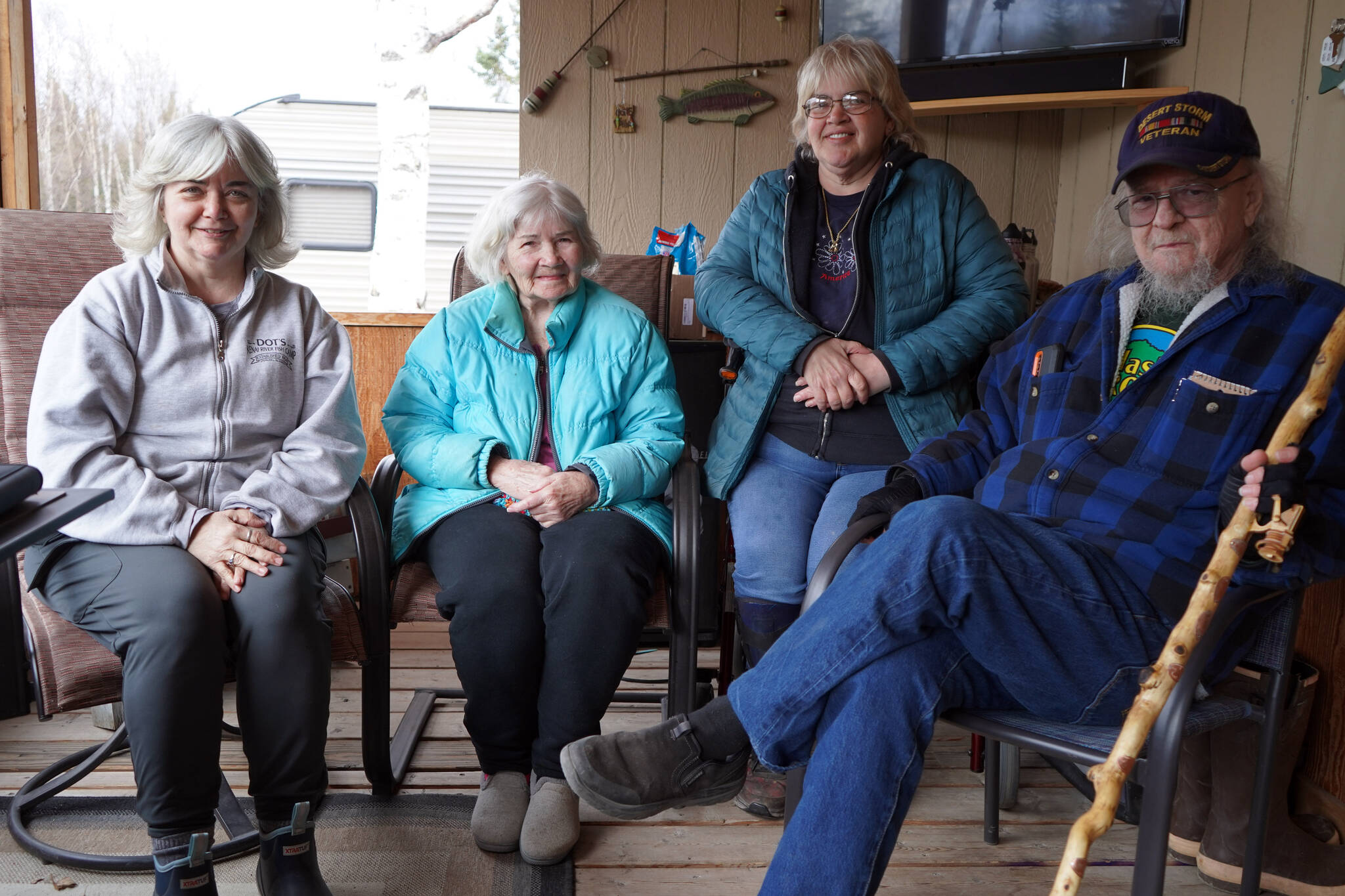On March 4, during the Upper Cook Inlet Meeting of the State Board of Fisheries, a proposal was adopted that expands a restriction on the use of bait and multiple hooks in an area of the Kenai River — between the Moose River Confluence and the outlet of Skilak Lake — to be in effect year-round.
In response to that change, a group of Sterling-based fishers have organized as Sterling Sportfishing Support to pursue a reversal of the rule, which they say precludes some people, especially those who are older or who have disabilities, from the fishery.
On Saturday, 12 people gathered at Dot’s Kenai River Fish Camp to speak about their concerns with the rule and the way the proposed regulation changes were messaged locally. They said that they weren’t even aware of the proposal until after it passed and are now grappling with what it means for their lifestyle.
Sue Stephenson, Donna Anderson and Steve Irvine were among the group. Also attending were Eddie Thomas, a disabled veteran, and Betty Stephenson, Sue and Anderson’s mother, who said that as she’s grown older, she’s lost the ability to cast.
Both Betty and Thomas said they won’t be able to fish as they always have with the new bait restriction.
“They can’t enjoy the river,” Sue said.
The proposal, authored by the Cooper Landing Fish and Game Advisory Committee, was approved in a unanimous vote by the board, who said their intention was to protect coho salmon.
Josh Hayes, chair of the committee, testified to the board on multiple days of the meeting — which was held in Anchorage — and said that the proposal seeks to address the mortality of silvers that are caught and released with bait, also that the change would better align with “traditional means of fishing” in the area.
During deliberations in March, board member Gerad Godfrey, who supported the measure, said the Cooper Landing committee had assured him in a private conversation that the proposal wouldn’t discriminate against any fishers and that he was particularly compelled by the argument that they were returning to “traditional means.”
The group pushed back on both claims, saying that studies of mortality cited by Hayes in testimony — describing Unalakleet — can’t be so easily grafted onto the Kenai. They said they’re catching coho for the purpose of eating them, and that they’ve been doing it the same way since the 1960s.
“It targets one type of fishing,” Irvine said. “It does nothing to protect the coho salmon.”
The group pointed to other proposals that would have simply reduced bag limits for silver salmon as a better way to increase protections on the stock.
During board deliberations, there were questions about whether the stock needed protection — the State Department of Fish and Game doesn’t track run strength for coho salmon on the Kenai River, and data shared by the department cited by Area Management Biologist Colton Lipka shows that harvest has been broadly steady in recent years.
The proposal was officially opposed by the department, who wrote in their comments to the board that it would “add further restrictions to methods and means without biological justification.”
A key concern of the group, Sue said, was the lack of awareness surrounding such a significant change. Though the proposal was published in the bulk proposal book in September and then passed in March, Sue said she hasn’t been able to find anyone who was aware of the change being made — and, certainly, no one was at the board meeting in Anchorage to speak against it.
The Board of Fisheries moves in three-year cycles, so the Upper Cook Inlet region, which includes the Kenai River, is not scheduled to be addressed again until 2027. The group said they’re working to get their issues heard out of cycle.
Anderson said they’ve been in touch with biologists and with fishers from the Togiak River who have successfully gotten their issues heard out of cycle.
“It is possible,” she said. “You have to go through all their hoops.”
The group is preparing an emergency petition and an amendment proposal, with the idea to have the matter revisited upon next year’s completion of an in-progress study on coho runs by the U.S. Fish and Wildlife Service.
To qualify for an emergency petition, they said they have to prove that “general welfare” is being impacted. They said the change fails to provide for the well-being of those people, like elders or people with disabilities, who rely on the bait to fish.
Going downstream to where the restriction isn’t in place also isn’t an option because they would need to navigate dangerous rapids.
“There’s not a huge amount of bait fishermen anymore — there’s not a huge amount of silver fishermen anymore either,” Sue said. “But we’re still here. We still want to fish. We still want to get silvers and I still want to can and smoke (them) and have a supply for the winter.”
“And our mom still wants to get in the boat and do what she has been doing for years,” Anderson said.
For more information, find “Sterling Sportfishing Support” on Facebook.
Reach reporter Jake Dye at jacob.dye@peninsulaclarion.com.

